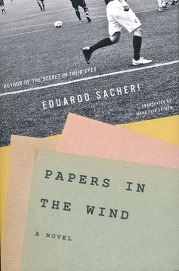 Eduardo Sacheri
Eduardo Sacheri
translated by Mara Faye Lethem
Other Press ($17.95)
by John Toren
Argentine novelist Eduardo Sacheri’s career received a boost when a film based on his first novel, The Secrets in Their Eyes, won the Academy Award for Best Foreign Film in 2010. In Papers in the Wind, some of the same elements appear: the legal profession, the issue of class, grown men sustaining their adolescent world through banter around a café table. The new work, however, lacks its predecessor’s intrigue and strong feminine presence. It’s a small-scale novel focused on the lives of four neighborhood friends: Mono, “the ape”; his cautious, almost saint-like brother, Fernando, who’s a language arts teacher; his best friend, Russo, a happy-go-lucky loser who owns a car wash; and Mauricio, who’s done the best for himself by becoming a lawyer. They’ve known one another since childhood and still get together regularly, though their conversations are often riddled with jibes and insults.
Very early in the novel, Mono dies, and from that point on, the book takes on the character of a well-shuffled deck of cards. Some chapters deal with the early lives of the individuals in the group, and also with their attempts to discuss God, death, and why the local soccer team has fallen on hard times. Others move beyond Mono’s death to focus on a very different problem. Mono had been a promising soccer player as a youth, and though his athletic career fizzled, he never lost his love for the game. After receiving a handsome buy-out from the software company where he works, Mono decides to get back to soccer by buying the rights to a young player named Pittilanga. When Mono dies, his three friends are saddled with the responsibility of finding a way to retrieve his rash investment on behalf of his young daughter, Guadeloupe.
A series of comic episodes follow. Mono seems to have paid far too much for Pittilanga, and in any case, none of his friends has the slightest idea how to sell the rights to a soccer player. They resort to taking videos of their man, who’s gained weight and lost his knack for scoring, and then hiring someone to doctor the footage. They bribe a media star who promises to “talk up” Pittilanga’s talents and potential on the radio. To finance the bribe, they sell Mauricio’s fancy car to a chop-shop and then file for insurance.
The story is further complicated by the fact that Mauricio’s boss, who’s about to make him a partner, has an entirely different idea about what to do with Pittilanga—a plan that Mauricio can’t tell his friends about, because it doesn’t include them.
Women appear only intermittently in the story, though details of Mauricio’s fling with his secretary and subsequent visit to a marriage counselor serve as an amusing subplot. Fernando is separated; Ruso’s wife is forever worried that he’s spending too much time playing video soccer with his employees at the car wash and not enough time drumming up business; Mono’s short-lived marriage was a disaster from the beginning.
Beneath the sometimes-harsh tone of the clique’s conversations, a long-standing affection continues to simmer. These men are driving each other crazy—but they’re also looking out for one another. During the many short chapters of hospital dialogue, Mono’s awkward attempts to deal with his impending death, and his friends’ efforts to be honest with him, are moving.
While the cover of Papers in the Wind might lead us to believe it’s a book about soccer, it’s actually a book about four men who have never really grown up. But Sacheri reminds us from time to time—and it’s an important aspect of the book’s emotional dynamic—that the goal toward which all their efforts are directed is to provide a decent inheritance for Guadeloupe. Although we don’t meet her until the last few pages of the book, she acts as the beating heart of this gruff but carefully detailed and ultimately affecting novel.

